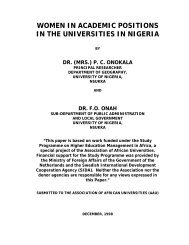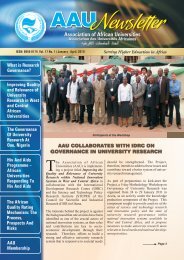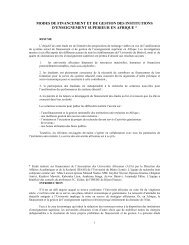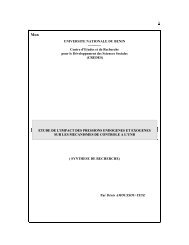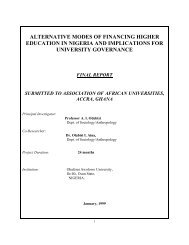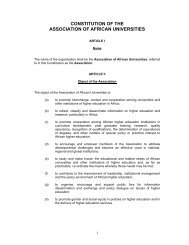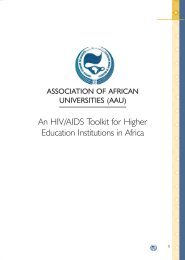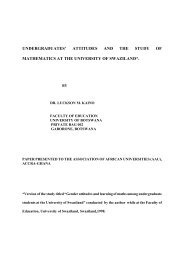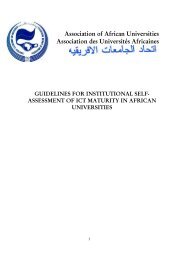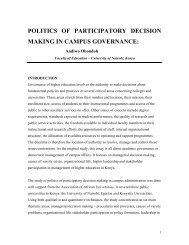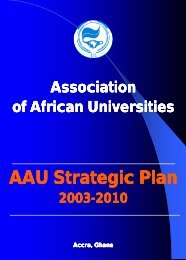governing teacher education colleges in south africa
governing teacher education colleges in south africa
governing teacher education colleges in south africa
Create successful ePaper yourself
Turn your PDF publications into a flip-book with our unique Google optimized e-Paper software.
41<br />
Students and faculty argue that adm<strong>in</strong>istrators should make the policy of affirmative action<br />
a publicly stated personal and <strong>in</strong>stitutional priority and commitment. Second, they<br />
suggested that adm<strong>in</strong>istrators should make recruitment of disadvantaged groups a job<br />
requirement for subord<strong>in</strong>ates and successful accomplishment of this goal an important part<br />
of performance evaluation and salary review. Third, they also suggested that adm<strong>in</strong>istrators<br />
should make themselves aware of current research on affirmative action and its potential<br />
impact on the policies and practices of their <strong>in</strong>stitution. Fourth, adm<strong>in</strong>istrators should<br />
support the mentor<strong>in</strong>g of promis<strong>in</strong>g disadvantaged members and be prepared to<br />
demonstrate will<strong>in</strong>gness to sponsor and advance someone “quite different from<br />
themselves.” Fifth, there were also suggestions about the need to transform and educate<br />
the members of college councils about the importance of affirmative action and<br />
employment equity <strong>in</strong> the <strong>in</strong>stitutions that they govern.<br />
The term “dead wood” was frequently used to refer to the old adm<strong>in</strong>istrators and faculty<br />
members who seem to be unable to adjust to the new <strong>education</strong>al context. The<br />
Employment Equity Act was referred to as provid<strong>in</strong>g an effective policy basis for replac<strong>in</strong>g<br />
these <strong>in</strong>dividuals with young and more dynamic scholars. For this purpose, <strong>in</strong>stitutions need<br />
“to grow their own timber” or develop new faculty through staff development programmes.<br />
13. Conclusions and emerg<strong>in</strong>g trends<br />
In essence, <strong>teacher</strong> <strong>education</strong> <strong>colleges</strong>, as <strong>in</strong>stitutions of higher <strong>education</strong>, represent<br />
communities or groups of scholars, which we call <strong>colleges</strong>, organised and ma<strong>in</strong>ta<strong>in</strong>ed to<br />
achieve certa<strong>in</strong> purposes. Such communities must be governed <strong>in</strong> such a way as to provide<br />
a degree of freedom, flexibility and variety with a maximum amount of order, accountability<br />
and responsibility. The employer-employee relationship is not appropriate for an academic<br />
community. Although more standardised than many other <strong>in</strong>stitutions of higher <strong>education</strong>,<br />
<strong>teacher</strong> <strong>education</strong> <strong>colleges</strong> are fundamentally different from bus<strong>in</strong>ess, military, and<br />
governmental organisations that <strong>in</strong>fluence, <strong>in</strong>deed almost dom<strong>in</strong>ate, modern thought and<br />
behaviour. Faculty members do not work for the college; they are the college, responsible<br />
members of a self-<strong>govern<strong>in</strong>g</strong> community whose relative autonomy is crucial to the nature<br />
and process of higher <strong>education</strong>.<br />
This perspective, highly shared by most participants <strong>in</strong> this study, po<strong>in</strong>ts to the follow<strong>in</strong>g<br />
characteristics of effective college governance: (i) strong leadership, particularly among<br />
college adm<strong>in</strong>istrators; (ii) strong <strong>in</strong>ternal organisational structures, sensitive to the needs of<br />
stakeholders; (iii) formal and <strong>in</strong>formal dialogue between the various groups with<strong>in</strong> <strong>colleges</strong>;<br />
(iv) effective flow of <strong>in</strong>formation; (v) co-operative relations at <strong>in</strong>ternal and <strong>in</strong>ter-<strong>in</strong>stitutional<br />
levels as well as between government officials and members of the college community; (vi)<br />
no <strong>in</strong>terference with the legally allowed level of college autonomy; (vii) accountability on<br />
the part of <strong>colleges</strong> to government and the wider society; and (viii) partnership with the<br />
schools. Democratically elected student and staff representation should be ensured, and<br />
those elected should be represented at all levels of college governance.<br />
41



